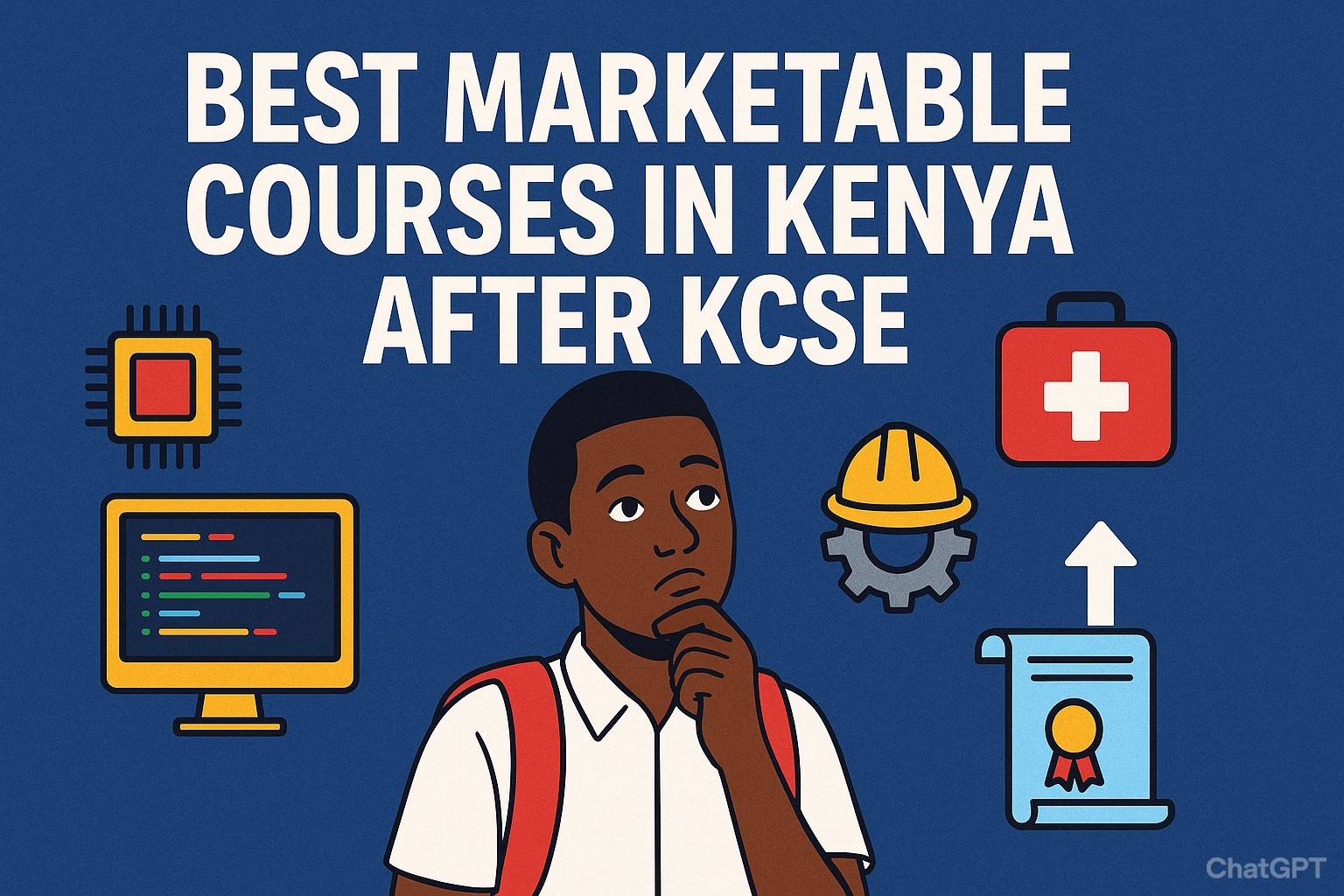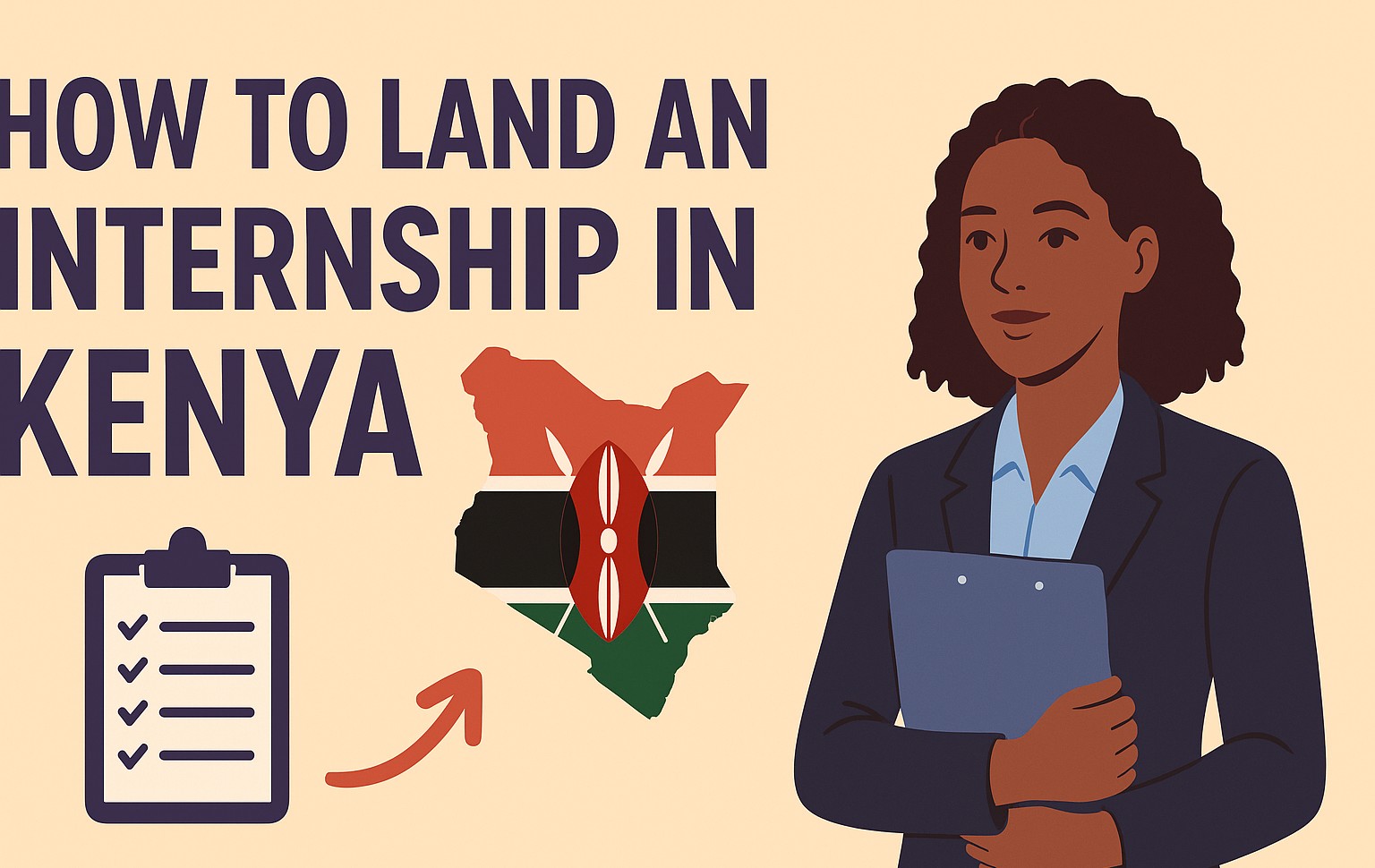

Titus Morebu
Author
Recommended Courses to Study After KCSE in Kenya for Best Market Value
Explore top marketable courses after KCSE in Kenya; from tech to healthcare and trades. Make smart career choices with ROI, demand & future growth in mind.
Why Choosing a Marketable Course After KCSE Matters 🎯
After Kenya Certificate of Secondary Education (KCSE), the course you pick can shape your future—job prospects, income levels, relevance in the evolving job market. A “marketable course” means one that has strong demand, offers good income or possibility of self-employment, and is future-proof (i.e. less likely to become obsolete quickly).
What Makes a Course Truly Marketable in Kenya
- High Industry Demand – Sectors like healthcare, tech, infrastructure, renewable energy are expanding fast.
- Practical & Technical Skills – Courses with hands-on, applicable skills (not just theory) tend to give better employment chances.
- Shorter Pathways or Flexible Learning – Diplomas, certificates, bootcamps, online modules — options that allow quicker entry into the workforce.
- Self-Employment Potential – Trades, digital skills, entrepreneurship enable people to create their own jobs.
- Alignment with National & Global Trends – Government plans, technology shifts (AI, data, cybersecurity), green energy, etc.
Top Marketable Courses in Kenya After KCSE
1. Technology & Digital Skills
- Software Development / Computer Science High demand from both public and private sectors; skills in programming, web & app development, systems design. Graduates can work for tech firms, startups or as freelance developers.
- Cybersecurity & Information Security With increasing cyber threats, banks, companies, government need trained professionals. Short courses or certifications add value quickly.
- Data Science, Analytics & AI Basics Businesses want insights from data. Learning statistics, machine learning, data visualisation, and business intelligence makes you valuable.
- Business Information Technology (BIT) Combines computing and business skills; good for roles that require both technical and management understanding.
2. Health & Medical Fields
- Medicine & Surgery Long training but remains one of the fields with highest professional demand and compensation.
- Nursing & Specialized Nursing There are shortages of nurses in rural and urban areas; specialization (critical care, mental health etc.) adds to appeal.
- Pharmacy & Clinical Practice Opportunities in hospitals, research, community setup, retail pharmacy.
- Public Health & Health Management Especially relevant in policy, disease control, health systems increasingly important (pandemics, infrastructure, rural health access).
- Clinical Officers, Medical Laboratory Science More accessible than full doctor path, yet still essential to healthcare delivery.
3. Engineering, Infrastructure & Built Environment
- Civil Engineering Infrastructure growth (roads, bridges, housing) keeps this in demand.
- Electrical / Electronics / Mechatronics Engineering With electrification, IoT, renewable energy systems, robotics, etc.
- Mechanical Engineering Manufacturing, automotive, energy sectors need mechanical expertise.
- Architecture & Urban Planning As cities grow, smart design, sustainable building are key.
4. Business, Finance & Accounting
- Finance, Accounting & Economics Every institution needs financial management, audits, risk analysis, etc. Professional certifications like CPA are huge boosters.
- Business & Entrepreneurship Courses in business administration, management, small business development; very useful if you want to start your own venture.
- Digital Marketing & E-Commerce With growth of online business, social media, content creation — these skills are highly sought after.
- Project Management Especially good if you want roles that coordinate teams, projects in construction, tech, NGOs.
5. Vocational, Trade & Creative Skills
- Electricians, Plumbers, Welders Skilled trades remain essential in both urban development and rural settings; high potential for self-employment.
- Auto Mechanics & Automotive Repairs Cars are everywhere — repairs, servicing always needed.
- Beauty Therapy, Hairdressing, Fashion Design Good for entrepreneurial spirits; works well with local market and personal branding.
- Culinary Arts & Catering Hospitality and events still robust; many new business opportunities.
- Driving & Logistics / Transport Trade Skills Logistics is growing; transport, delivery, haulage are expanding with trade and e-commerce.
6. Emerging & Green Economy Courses
- Renewable Energy Technology Solar, wind, biomass — both installation and maintenance; Kenya is investing in green energy.
- Environmental Science & Sustainability Especially roles in policy, climate change mitigation, conservation.
- Geospatial Information Systems (GIS), Remote Sensing Used in mapping, agriculture, planning, disaster management, wildlife, resource exploration.
How to Choose the Best Course for YOU
Selecting any of the above is not enough; you must pick strategically.
- Assess Your KCSE Grades & Subject Cluster Some courses (Medicine, Engineering, Actuarial Science) require high grades in science/math; others accept moderate grades.
- Consider Duration vs Cost Degree routes are longer and costlier; diplomas, certificates, vocational courses are faster and often cheaper.
- Look at Job Market Trends What are employers hiring now? Ask graduates or check local job ads; see national plans (e.g. Kenya’s Vision, ICT Masterplans).
- Factor Self-Employment Potential Even with a job, having skills that allow you to freelance, start your own business gives more flexibility.
- Upgrade Your Skills Continuously The world changes fast — for tech especially, but even healthcare & trades need constant updating (e.g. digital tools, new equipment, software).
Degrees vs Diplomas vs Certificates vs Technical Vocational Training (TVET)
| Pathway | Strengths | Limitations | Best Fit When |
|---|---|---|---|
| Degree | High recognition, higher potential income, advanced roles | Costly; lengthy; more competition | Your KCSE grades are high; you want specialized / professional roles |
| Diploma | Shorter time; practical; many employers accept diploma holders | Sometimes lower income; may need further upgrading | You want to enter field quickly; or use diploma as stepping stone |
| Certificate / Short Courses / Bootcamps | Quick, cheap; targeted skills; good for digital skills or trades | May have limited recognition; need to build portfolio / experience | You want fast entry; want to test interest; supplement your resume |
| TVET / Trade Schools | Hands-on; job / self-employment oriented; often affordable | Sometimes lower prestige; fewer theoretical foundations; potential for slower career progression if not upgrading | You are strong in skills; prefer working practically; want to start business/trade quickly |
Tips to Maximize Return on Your Education Investment 💡
- Supplement course studies with internships or hands-on experience whenever possible.
- Leverage free online platforms and certifications (MOOCs) to stay relevant.
- Network — both with classmates & professionals; mentorships help a lot.
- Be ready to adapt — technological shifts, policy changes, global pressures may change demands.
- Consider location: urban vs rural job opportunities; migration; remote work possibilities.
- Always check the accreditation & reputation of the institution. A certificate from an accredited school or recognized bootcamp carries more weight.
Conclusion
Choosing the right course after KCSE can be overwhelming, but focusing on skill demand, employment trends, cost vs return, and your passion can guide you well. Whether you aim for medicine, tech, trades, creative arts, or green sectors, the key is to pick something that not only meets current market needs but can grow with you. When you combine the right course with continuous learning and practical experience, your degree or certificate becomes a true stepping stone to success.
External Resources for Further Guidance
For up-to-date statistics, course requirements, and career outlook, check these sources:
- KUCCPS – see placements, cut-offs & subject clusters
- Kenya National Bureau of Statistics – labour force surveys & trends
- Ministry of Education, Kenya – policies & education sector updates
Gallery

Related Articles
3 articles
How to Apply for a Canadian Student Visa from Kenya in 2025 🍁
Learn the complete, up-to-date process, requirements and tips for Kenyans applying for a Canadian study permit in 2025. Stay ahead with changes and best practices.

Best Free Learning Apps for Kenyan Students in 2025
Discover powerful free learning apps for Kenyan students — from curriculum-aligned platforms to global resources that work offline and on low-data connections.

How to Land an Internship in Kenya: A Step-by-Step Guide to Success 🚀
Discover the most effective strategies to secure internships in Kenya—eligibility, applications, channels, preparation, visa tips—and stand out in 2025.